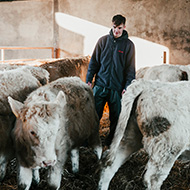SRUC launches new rural animal health course

Students on the Rural Animal Health course will perform permitted procedures and provide advice on multiple farm and rural animal species.
As it works towards growing Scotland’s first tertiary model of veterinary teaching and learning, Scotland's Rural College (SRUC) has announced an array of new courses, including a Higher National Diploma (HND) in Rural Animal Health.
Designed to support veterinary teams working in rural animal practice, the Rural Animal Health course is the first of its kind in the UK and comes amid growing demand for veterinary technicians to support rural veterinary teams.
Other courses to be offered by the College in September include the BSc (Hons) course focusing on Animal Welfare Science and the first BSc (Hons) Equine Science and Management course in Scotland. A postgraduate Master of Research (MRes) in Zoonoses and Epidemiology will also be delivered from Inverness, mainly via distance learning.
Students on the Rural Animal Health course, taught at SRUC's Craibstone campus, will work both within a team and independently, performing permitted procedures and providing advice on multiple farm and rural animal species.
The only degree programme of its kind in the UK, the Animal Welfare Science course at SRUC's Edinburgh campus draws on the expertise of one of the largest animal welfare research teams in the world.
Students on the Equine Science and Management course will be equipped with the skills and knowledge to make an effective contribution to the equine industry. The degree is the first to be offered at SRUC’s Oatridge campus in West Lothian and the first of its kind in Scotland.
Focusing on developing research skills in the epidemiology of animal diseases and the transmission of zoonoses, the one-year Zoonoses and Epidemiology course can also be studied part-time.
SRUC academic director, Jamie Newbold, said: “These new courses add to SRUC’s strength and depth of provision in animal welfare and veterinary science as we move towards becoming an enterprise university at the heart of our sustainable natural economy.”



 The RCVS has announced a new version of its 1CPD mobile app, with enhanced features for veterinary surgeons and veterinary nurses to record their continuing professional development.
The RCVS has announced a new version of its 1CPD mobile app, with enhanced features for veterinary surgeons and veterinary nurses to record their continuing professional development.